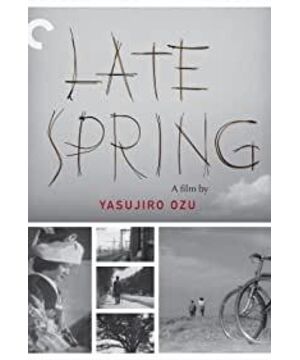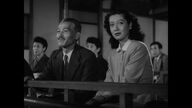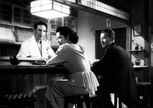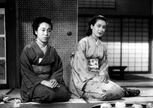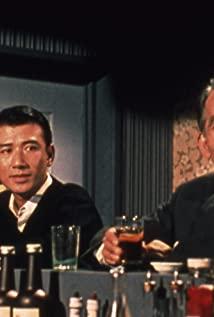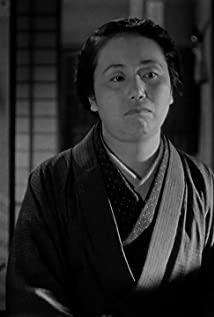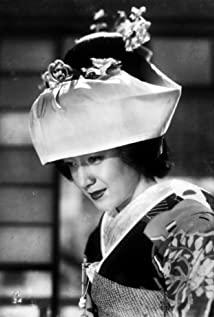LATE SPRING is the first entry of Yasujirô Ozu's so-called “Noriko trilogy”, followed by EARLY SUMMER (1951) and TOKYO STORY (1953), they all share a character named Noriko by Setsuko Hara, though they are played unrelated. It heralds Ozu's heyday in his late career as one of the most influential and distinguished filmmakers of our time, meanwhile AN AUTUMN AFTERNOON is his swan song, made one year before his untimely death at age 60. They are the two faces of the same mirror because the central plot is exactly the same, a middle-aged widower (played by Chishû Ryû in both cases) reluctantly persuades his eligible daughter to get married, and the latter reluctantly acquiesces. While not officially a remake,AN AUTUMN AFTERNOON can be read as Ozu's shifted concern of the subject matter when he reaches the twilight years and is more aptly identified with the widower's fix, it is also a palimpsest beautifully color-rendered; yet LATE SPRING endures as the original masterpiece that showers the father/daughter dyad with equal sympathy and astuteness.
In LATE SPRING, the daughter Noriko's fond attachment with her father is delineated with supernal candor and lucidity, the symbiosis between them is simply felicitous for both, it is only natural for a 27-year-old Noriko to be “selfish” to uphold the status quo, even she is fully aware of what it means to her, the contentment of taking care of her father is enough for her. Hara beams radiantly with her expansive smile, but a twinge of trepidation often betrays her Noriko's misgivings. When jealousy takes over, Hara can throw a tantrum like a petulant girl, also the familiarity between Noriko and her best friend Aya (a fetching Tsukioka), a divorcée who represents the modernity of post-war Japan, feels organic, they can bicker and then patch things up in the next breath.
Ryû's father has a conformable makeup, he knows Noriko's prospect rides on a good marriage, as she has no occupation or other means, a housewife is all she is made for (during the course of the trilogy, Noriko has a clear orbit of acquitting herself with more independence and decisiveness, here, she is a traditional woman who does not think marriage is what she wants. The umbilical cord must be severed, to achieve which he is not above to adopt mendacity. But the key takeaway is the father's sagacious exhortation of how to make marriage work during their last father-daughter trip to Kyoto, it is all platitude, but Ryû's measured, gracious delivery is heartwarmingly eloquent, it almost makes you forget it is an arranged marriage and want to take the plunge yourself. Yet, since the bridegroom is conspicuous by his absence in both pictures,what do you make of Ozu's stance of this sort of marriage?
If the daughter's chance of domestic bliss is rather a crapshoot, Ozu is dead certain of the father's lonesome denouement, slumping in the comedown of marrying off his daughter, “mono no aware” is invoked by the fall of a peeled apple and the melancholic score .
13 years later, in AN AUTUMN AFTERNOON, Ozu rehashes the same material (with almost the same team) and shifts his priority to the widower, whereas the daughter, played by an archly inscrutable Shima Iwashita, is sidelined without much agency of her own. Adding two siblings to the household, Ozu and his long-time screenwriter Kôgo Noda calmly criticizes what a young couple's marriage life would look like, rife with western influences and consumerism like expensive golf clubs and leather bags, squabbles about money issues. As the elder brother, Keiji Sada studiously moderates his character with the-apple-never-falls-far-from-the-tree traits, even-tempered, taciturn but imperturbable from his wife's nagging.
Strewn the reflexion of WWII (penitence is salted with mockery) into the play, showing him tipple with his friends and frequent a bar whose owner reminds him of his deceased wife, AN AUTUMN AFTERNOON puts the father in the forefront, and alerts him with a counterexample, one of his schoolteachers, who is nicknamed “the Gourd” ( Tôno, wonderfully maudlin and outrageously courteous, he becomes obsequious), leads a wretched life with his middle-aged unmarried daughter (Sugimura, who kinetically plays the busybody auntie in LATE SPRING, is uncharacteristically bitter as a victim of spinsterhood), to galvanize him into expediting the marriage plan. However the urgency is undercut by Ryû's perpetually costive acting style, forever enshrined as the paradigm of a Japanese father on the screen, Ryû's graciousness,urbanity and consideration is everything you might look for in a father figure, he oozes the best qualities of humanity.
That said, if LATE SPRING, melancholia aside, is also suffused with Hara's vitality and joviality, in AN AUTUMN AFTERNOON, Ozu's mood turns cynical, even cruel by way of tit-for-tat pranks during the bull sessions, the filthiness of remarriage in LATE SPRING now progresses/decays into the dirtiness of a May-December second marriage with seedier undertones. And the equivalence between marriage and funeral is underscored, the ending is still the same, the father is left alone in his reminiscences, but this time, he has another adult son to bank on, or can't he?
Technically, in both pictures, Ozu masters his trademark trinity - narrative “ellipses” (key events like the daughter's arranged meeting with her future husband and the wedding ceremony are skipped), low-angle static camera frame, and pillow shots - to a fare -thee-well. AN AUTUMN AFTERNOON are exceedingly beauteous with its polychromatic coloration, and LATE SPRING is another acme of Ozu's fecund creation, not only it has form, structure, emotion and philosophy in a compact combo, but also a necessary pinch of tact and discretion that always elevates a film's appreciation in my book.
referential entries: Ozu's EARLY SUMMER (1951, 8.6/10); TOKYO STORY (1953, 9.1/10).
English Title: Late Spring
Original Title: Banshun
Year: 1949
Genre: Drama
Country: Japan
Language: Japanese
Director: Yasujirô Ozu
Screenwriters: Kôgo Noda, Yasujirô Ozu
based on the novel by Kazuo Hirotsu
Music: Kenji Itô
Cinematography: Yûharu Atsuta
Editing: Yoshiyasu Hamamura
Cast:
Chishû Ryû
Setsuko Hara
Yumeji Tsukioka
Haruko Sugimura
Jun Usami
Masao Mishima
Kuniko Miyake
Toyo Takahashi
Rating: 8.7/10
English Title: An Autumn Afternoon
Original Title: Sanma no abi
Year: 1962
Genre: Drama
Country: Japan
Language: Japanese
Director: Yasujirô Ozu
Screenwriters: Kôgo Noda, Yasujirô Ozu
Music: Takanobu Saitô
Cinematography: Yûharu Atsuta
Editing: Yoshiyasu Hamamura
Cast:
Chishû Ryû
Shima Iwashita
Keiji Sada
Mariko Okada
Nobuo Nakamura
Eijirô Tôno
Ryûji Kita
Kyôko Kishida
Teruo Yoshida
Shin'ichirô Mikami
Toyo Takahashi
Haruko Sugimura
Daisuke Katô
Kuniko Miyake
Noriko Maki
Rating: 8.4/10
View more about Late Spring reviews


